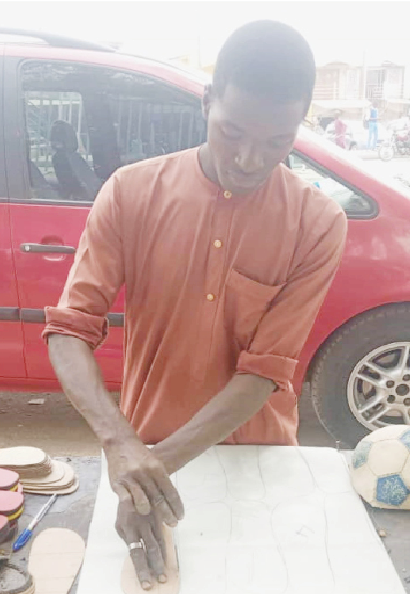Youth undermine their creativity, suffer unemployment — Ahmed
Adamu Ahmed is a 26-year-old shoemaker in Bauchi State. The secondary school leaver said the trade, which is helping him through life, is being overlooked by others thereby causing many to be on the streets looking for the increasingly hard-to-get white-collar jobs. But his foray into the creativity of modelling shoes to beautify the […]

Adamu Ahmed
Adamu Ahmed is a 26-year-old shoemaker in Bauchi State. The secondary school leaver said the trade, which is helping him through life, is being overlooked by others thereby causing many to be on the streets looking for the increasingly hard-to-get white-collar jobs.
But his foray into the creativity of modelling shoes to beautify the feet of his customers wouldn’t have happened if not for one of his elders who took an interest and made the effort of taking him to his workshop when he was eight years old.
Ahmed said the workshop, located behind the Wunti market in the state, also served as their playground as kids from where he still paid attention to how his brother crafted nicely made shoes for his customers.
“As time went on, that turned out to be a part of the process of learning the skill and today, courtesy of that, I am happily self-employed and even training other young ones.”
He faulted how many young people undermined their creativity of refusing to utilize their God-given talents to produce useful things that could help them earn money and employment.
- More than 80% of Gaza’s population displaced
- Direct energy used in muzzling opposition to improve economy, NNPP tells APC
That inaction by the youth, he said, contributes to the increasing number of unemployed youths in the country today.
“There are many of my schoolmates with whom we started learning this job but who left because they looked down on the skills and the shoe-making job. They are now roaming from one angle to another looking for white-collar jobs,” he said.
For him, staying behind to learn the skill despite the difficulty made him combine learning shoe-making and his educational pursuits with doggedness leading to the completion of his secondary school and also pursuing Islamic education.
Ahmed stressed that he feels fulfilled for being self-employed and able to train some younger ones to be self-reliant.
“I have made a lot of fortune from shoemaking. I have bought a brand new motorcycle; I sponsored my education and bought other necessary tools. I support my parents financially and even my neighbours when the need arises.”
He said he makes a profit of N2,000 or more daily depending on sales in the market but could realise over N3,000 on a good day.
“I deal mostly with wholesalers who buy in bulk and retailers. I also display a variety of shoes at the Wunti roundabout for interested individuals who buy one or two pairs.”
He added that he buys high-quality materials to produce good and strong shoes to compete favourably in the market. In the past, “we used to buy local materials to produce our shoes but we no longer patronize the local sources, instead we only buy quality items to produce good shoes that attract high sales in the market.”
“Many don’t patronize poorly made shoes and for you to remain relevant in the system you have to produce quality shoes. Although the profit is not much, the little gain is stable, as even individuals who buy the quality ones return to buy more. I remember one of my customers who bought a pair of shoes that lasted for more than one year. He came back to buy more for himself and his family, because of the high quality.”
He said the major challenge in the business is the increase in the prices of materials to produce good shoes as almost all have skyrocketed, with some going up twofold.
Also, he said the purchasing power of customers has reduced.
“What we discovered is that the majority of our customers patronise our shoes because of the good quality but lower prices. Because when you increase prices there is the possibility of losing customers. Even when the prevailing condition compelled us to increase our price, sales drastically reduced.”
He said with the right support for capital for the purchase of working tools and quality materials, he can produce shoes that will compete with those made in factories.
“I have a dream to produce world-class shoes that will stand the test of time, with the necessary support.”
He further appealed to the state government to include shoe-makers among the trade unions benefiting from its financial support “because our trade is equally important and can provide employment opportunities to unemployed youths and boost the economy of the state through revenue generation to the government.”
